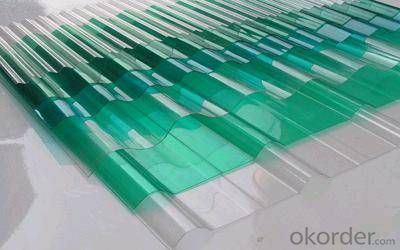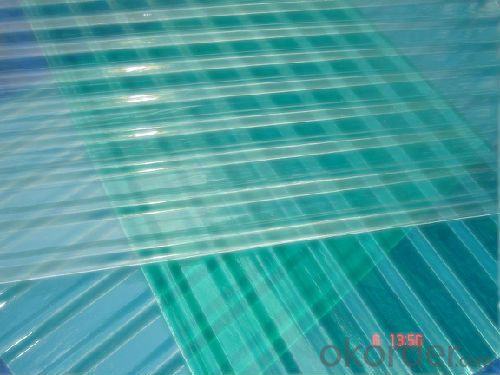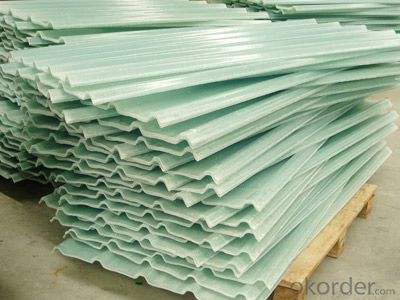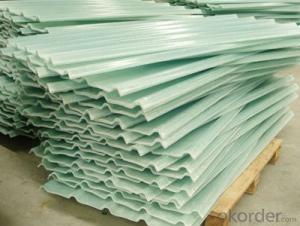FRP Roofing Sheet(Panel)
- Loading Port:
- China Main Port
- Payment Terms:
- TT or LC
- Min Order Qty:
- -
- Supply Capability:
- -
OKorder Service Pledge
OKorder Financial Service
You Might Also Like
1:Brief Introduction
Although the FRP anti-corrosion panel are produced in the same production line with FRP skylight panel, it has greater and more requirements of the professional technology. There are only a few of the manufacturers who can produce FRP opaque panels in


2:Characteristics
High light transmission
Good weather resistance
High impact resistance
Excellent corrosion resistance
Excellent temperature performance
Excellent sound insulation
Excellent heat stability
3:Technical Specification
Plate matches: match with general prepainted galvanized sheet, galvanized steel
Resin composites: Improved anti-aging SMR198 resin
Fiber reinforcement: E-glass fiber untwisted without glue
Surface treatment: affixing MELINEX301 film
Stiffener line: surface with longitudinal uniform distribution of anti-LAC gluten
Glass fiber: not less than 28%
Unit Weight: 1800g / ㎡, 2400g / ㎡, 3050g / ㎡
Nominal thickness: 1.2 mm, 1.5mm, 2.0mm (tolerance ≤ 10%)
Temperature limits: -60 ℃ ~ +130 ℃
Transmittance (1.5mm): 72% ± 2% (fog white, sky blue, water green), 52% ± 2% (white porcelain)
UV-rate: 99%
Tensile strength: 90Mpa
Flexural strength: 160 Mpa
Elongation: 1.9%
Pap hardness: ≥ 50
Thermal expansion coefficient: 1.5 ~ 3.2 * 10-5 / K
Thermal conductivity: K = 0.23W / m * K
Guarantee: 15 years
NOTE: In special cases, the surface film varieties vary according to needs, such as Melinex389, PT055 and so on.

FAQ:
What is your minimum order quantity?
Our MOQ is 500 Square Meter/Square Meters (Without limiting sizes and specification)
2. How can I get samples to check your quality?
We can offer samples for free.
3. Can you do the production as customized?
Yes, we have a professional technique team, we could produce the glass depends on your requirements.
- Q:What is the weathering resistance of fiberglass mat tissue?
- The weathering resistance of fiberglass mat tissue is generally considered to be high. Fiberglass mat tissue is made from a combination of fiberglass strands and a binder material, such as polyester or acrylic. This combination creates a strong and durable material that is resistant to various weathering factors, including exposure to sunlight, moisture, and temperature fluctuations. The fiberglass strands in the mat tissue provide excellent mechanical strength, preventing the material from breaking down under external stress or pressure. This strength helps the mat tissue withstand the impact of wind, rain, and other weather elements without significant damage. Additionally, the binder material used in the manufacturing process of fiberglass mat tissue is often formulated to be resistant to UV radiation. This UV resistance helps to protect the material from degradation and color fading caused by prolonged exposure to sunlight. It also helps to maintain the structural integrity and strength of the mat tissue over time. Furthermore, fiberglass mat tissue is also resistant to moisture and water absorption. This resistance prevents the material from becoming weakened or deteriorated when exposed to rain, humidity, or other moisture sources. As a result, the mat tissue remains intact and retains its performance properties even in wet or humid conditions. Overall, the weathering resistance of fiberglass mat tissue is considered to be excellent, making it a popular choice for various applications where durability and longevity in outdoor environments are required.
- Q:What is the expected lifespan of fiberglass mat tissue in underground applications?
- The expected lifespan of fiberglass mat tissue in underground applications can vary depending on various factors such as the specific conditions of the underground environment, the quality and thickness of the fiberglass mat tissue, and the level of maintenance and care provided. However, on average, fiberglass mat tissue is known for its durability and longevity, making it suitable for underground applications. In general, fiberglass mat tissue is designed to be highly resistant to corrosion, moisture, and other environmental elements commonly found in underground settings. This makes it a reliable choice for applications such as underground pipes, tanks, and other infrastructure where protection against deterioration is crucial. With proper installation and regular maintenance, fiberglass mat tissue can have an expected lifespan of 50 years or more in underground applications. However, it is essential to note that this estimate can vary depending on the specific conditions and usage of the fiberglass mat tissue. To ensure the maximum lifespan of fiberglass mat tissue in underground applications, it is recommended to follow industry best practices, such as proper installation techniques, regular inspections, and addressing any issues, such as cracks or damage promptly. By doing so, the lifespan of fiberglass mat tissue can be extended, providing long-term reliability and durability in underground settings.
- Q:Can fiberglass mat tissue be used for wall insulation?
- Yes, fiberglass mat tissue can be used for wall insulation. Fiberglass mat tissue is a lightweight and flexible material that is commonly used for thermal and acoustic insulation in buildings. It is made from fine fibers of glass that are woven together to form a mat. This mat is then used as a layer of insulation, either in the form of rolls or batts, that is placed between the wall structure and the finished wall surface. Fiberglass mat tissue is an effective insulation material because it has a high resistance to heat transfer. It helps to prevent heat loss in the winter and heat gain in the summer, reducing energy consumption and maintaining a comfortable indoor temperature. It also acts as a sound barrier, reducing noise transmission between rooms and from outside sources. Furthermore, fiberglass mat tissue is non-combustible, which means it does not contribute to the spread of fire. This makes it a safe choice for wall insulation, as it helps to slow down the progression of a fire and provides valuable time for occupants to evacuate. In addition to its insulation properties, fiberglass mat tissue is also easy to install. It can be cut to size and fitted into wall cavities, ensuring a snug and efficient insulation layer. It is also durable and long-lasting, providing insulation benefits for many years. Overall, fiberglass mat tissue is a suitable choice for wall insulation due to its thermal and acoustic properties, fire resistance, ease of installation, and durability.
- Q:Is fiberglass mat tissue suitable for insulation in chemical processing plants?
- Indeed, fiberglass mat tissue proves to be a suitable option for insulation within chemical processing plants. Comprised of delicate glass fibers securely bonded with a binder, it possesses remarkable thermal insulation characteristics. Its capability to endure elevated temperatures and its resistance against numerous chemicals render it an ideal selection for deployment in chemical processing plants, where contact with corrosive substances or intense heat may occur. Moreover, fiberglass mat tissue is lightweight and effortlessly installed, presenting a cost-effective solution for insulation in such industrial settings.
- Q:Can fiberglass mat tissue be used for insulating metal roofs?
- Yes, fiberglass mat tissue can be used for insulating metal roofs. It provides a layer of insulation that helps to regulate temperature and minimize heat transfer, making it suitable for insulating metal roofs.
- Q:What are the different quality standards for fiberglass mat tissue?
- There are several different quality standards that are used to assess the quality of fiberglass mat tissue. These standards are important for ensuring that the fiberglass mat tissue meets certain performance requirements and is suitable for its intended applications. One commonly used quality standard for fiberglass mat tissue is the ASTM D2178 standard. This standard specifies the requirements for fiberglass base materials used in the production of asphalt and coal tar roofing products. It includes criteria for the physical properties of the mat tissue such as weight, thickness, tensile strength, tear resistance, and permeability. Another widely recognized quality standard is the ISO 3376 standard. This standard provides guidelines for determining the tensile properties of nonmetallic materials, including fiberglass mat tissue. It specifies test methods for measuring parameters such as tensile strength, elongation at break, and modulus of elasticity. Additionally, the EN 1871 standard is often used for fiberglass mat tissue quality assessment in Europe. This standard specifies the requirements for reinforced bitumen sheets used in roofing applications. It includes criteria for the physical properties of the mat tissue and also covers aspects such as dimensional stability, resistance to heat, and resistance to aging. Furthermore, there are industry-specific quality standards that may apply to fiberglass mat tissue used in particular applications. For example, the ASTM C1666 standard is specific to fiberglass reinforced cementitious panels and establishes requirements for the materials used in their production. Overall, the different quality standards for fiberglass mat tissue aim to ensure that the material meets certain performance criteria, allowing it to be used effectively in various applications such as roofing, construction, and insulation. These standards provide a framework for manufacturers, suppliers, and customers to assess and compare the quality of different products in the market.
- Q:Is fiberglass mat tissue chemically resistant?
- Yes, fiberglass mat tissue is chemically resistant. Fiberglass mat tissue is made from fine glass fibers that are randomly oriented and bound together with a resin binder. This composition allows the material to exhibit excellent resistance to a wide range of chemicals including acids, alkalis, solvents, and oils. It is commonly used in industries such as chemical processing, petrochemicals, and wastewater treatment where exposure to various chemicals is common. The chemical resistance of fiberglass mat tissue makes it a suitable choice for applications requiring corrosion resistance and long-term durability.
- Q:What are the applications of fiberglass mat tissue?
- Fiberglass mat tissue, a versatile material, is utilized in a multitude of industries. Some notable applications include: 1. Construction and Building Materials: Within the construction industry, fiberglass mat tissue serves as a reinforcement material. It is commonly employed in the production of roofing shingles, insulation materials, and wall coverings. The robust and durable nature of fiberglass mat tissue enhances the structural integrity of buildings and bolsters their resistance to external elements such as wind, moisture, and temperature fluctuations. 2. Automotive Industry: The automotive sector extensively utilizes fiberglass mat tissue for manufacturing components like door panels, headliners, trunk liners, and interior trim parts. Due to its lightweight and high strength properties, fiberglass mat tissue is an ideal material for reducing the overall weight of vehicles while maintaining their structural integrity. 3. Marine Industry: The marine industry relies heavily on fiberglass mat tissue for constructing boat hulls, decks, and other structural components. The corrosion-resistant characteristics of fiberglass mat tissue make it well-suited for marine applications where exposure to water and harsh weather conditions is common. 4. Pipe Manufacturing: Fiberglass mat tissue is employed in the production of fiberglass reinforced pipes. These pipes find applications in various industries, including oil and gas, chemicals, and water management. The high strength and corrosion-resistant properties of fiberglass mat tissue make it an excellent choice for manufacturing pipes capable of withstanding high pressure and harsh chemical environments. 5. Filtration Systems: Fiberglass mat tissue plays a vital role in the production of air filters and liquid filtration systems. The fibrous structure of the material enables efficient filtration by trapping dust particles, dirt, and other contaminants. This makes fiberglass mat tissue the preferred choice for applications requiring high-efficiency filtration, such as HVAC systems, industrial air filters, and water treatment plants. In conclusion, fiberglass mat tissue finds extensive and diverse applications in industries ranging from construction and automotive to marine and filtration systems. Its unique properties make it an invaluable material for enhancing structural integrity, reducing weight, and improving performance across various sectors.
- Q:Can fiberglass mat tissue be used in structural applications?
- Indeed, structural applications can make use of fiberglass mat tissue. This lightweight and flexible material is frequently employed as reinforcement in construction and engineering endeavors. It is often combined with resin or concrete to enhance the structural integrity of diverse components. The remarkable strength-to-weight ratio of fiberglass mat tissue renders it exceptionally fitting for reinforcing walls, roofs, and floors. Furthermore, its resistance to corrosion, moisture, and chemicals allows for its utilization in diverse environments. The wide-ranging applicability and enduring nature of fiberglass mat tissue contribute to its widespread preference in structural applications.
- Q:Is fiberglass mat tissue biodegradable?
- No, fiberglass mat tissue is not biodegradable. Fiberglass is a synthetic material made from fine fibers of glass, which are woven together to create a strong and durable material. These fibers do not break down naturally over time, making fiberglass mat tissue non-biodegradable.
1. Manufacturer Overview |
|
|---|---|
| Location | |
| Year Established | |
| Annual Output Value | |
| Main Markets | |
| Company Certifications | |
2. Manufacturer Certificates |
|
|---|---|
| a) Certification Name | |
| Range | |
| Reference | |
| Validity Period | |
3. Manufacturer Capability |
|
|---|---|
| a)Trade Capacity | |
| Nearest Port | |
| Export Percentage | |
| No.of Employees in Trade Department | |
| Language Spoken: | |
| b)Factory Information | |
| Factory Size: | |
| No. of Production Lines | |
| Contract Manufacturing | |
| Product Price Range | |
Send your message to us
FRP Roofing Sheet(Panel)
- Loading Port:
- China Main Port
- Payment Terms:
- TT or LC
- Min Order Qty:
- -
- Supply Capability:
- -
OKorder Service Pledge
OKorder Financial Service
Similar products
New products
Hot products
Hot Searches
Related keywords




























